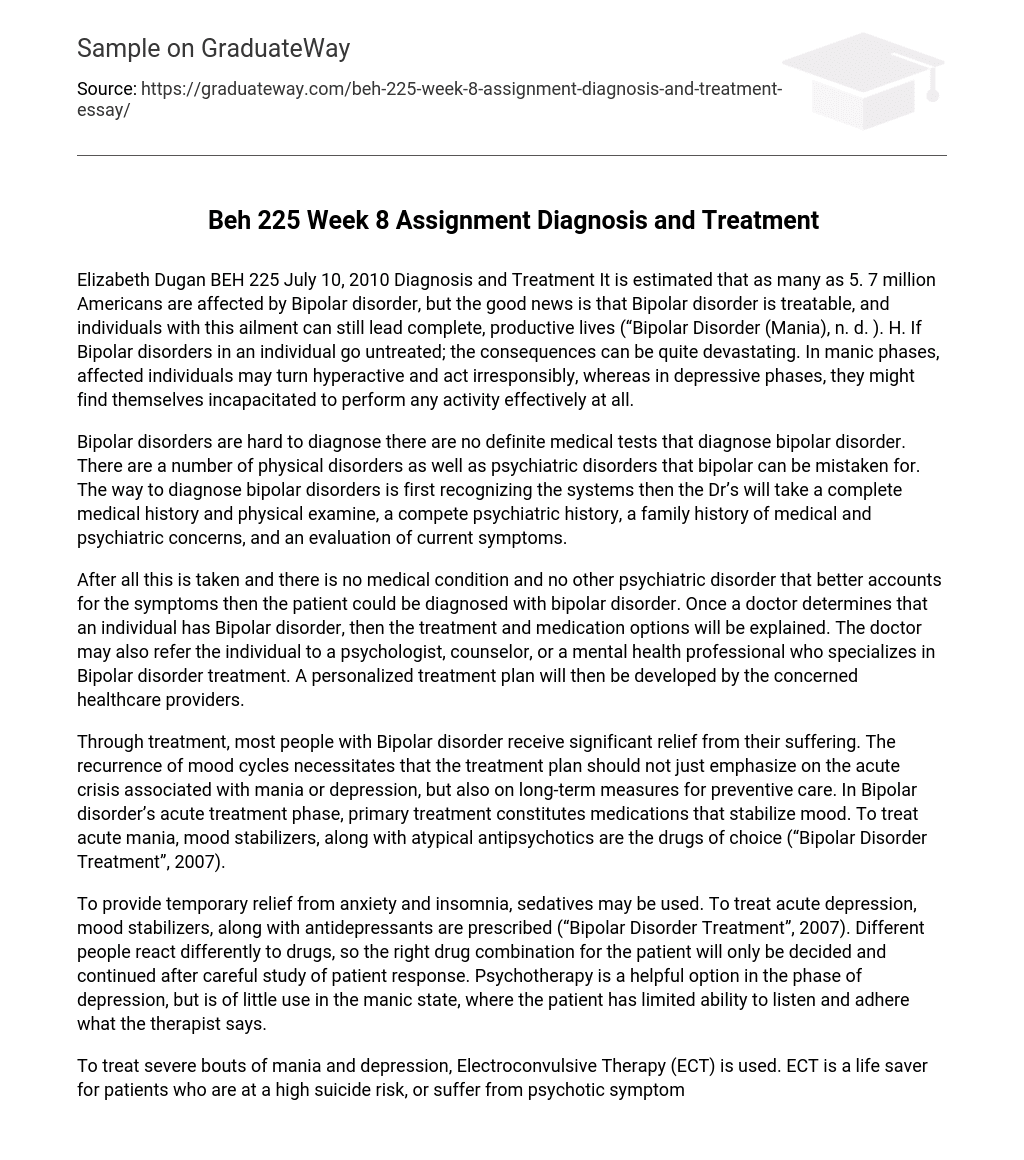It is estimated that as many as 5. 7 million Americans are affected by Bipolar disorder, but the good news is that Bipolar disorder is treatable, and individuals with this ailment can still lead complete, productive lives (“Bipolar Disorder (Mania), n. d. ). H. If Bipolar disorders in an individual go untreated; the consequences can be quite devastating. In manic phases, affected individuals may turn hyperactive and act irresponsibly, whereas in depressive phases, they might find themselves incapacitated to perform any activity effectively at all.
Bipolar disorders are hard to diagnose there are no definite medical tests that diagnose bipolar disorder. There are a number of physical disorders as well as psychiatric disorders that bipolar can be mistaken for. The way to diagnose bipolar disorders is first recognizing the systems then the Dr’s will take a complete medical history and physical examine, a compete psychiatric history, a family history of medical and psychiatric concerns, and an evaluation of current symptoms.
After all this is taken and there is no medical condition and no other psychiatric disorder that better accounts for the symptoms then the patient could be diagnosed with bipolar disorder. Once a doctor determines that an individual has Bipolar disorder, then the treatment and medication options will be explained. The doctor may also refer the individual to a psychologist, counselor, or a mental health professional who specializes in Bipolar disorder treatment. A personalized treatment plan will then be developed by the concerned healthcare providers.
Through treatment, most people with Bipolar disorder receive significant relief from their suffering. The recurrence of mood cycles necessitates that the treatment plan should not just emphasize on the acute crisis associated with mania or depression, but also on long-term measures for preventive care. In Bipolar disorder’s acute treatment phase, primary treatment constitutes medications that stabilize mood. To treat acute mania, mood stabilizers, along with atypical antipsychotics are the drugs of choice (“Bipolar Disorder Treatment”, 2007).
To provide temporary relief from anxiety and insomnia, sedatives may be used. To treat acute depression, mood stabilizers, along with antidepressants are prescribed (“Bipolar Disorder Treatment”, 2007). Different people react differently to drugs, so the right drug combination for the patient will only be decided and continued after careful study of patient response. Psychotherapy is a helpful option in the phase of depression, but is of little use in the manic state, where the patient has limited ability to listen and adhere what the therapist says.
To treat severe bouts of mania and depression, Electroconvulsive Therapy (ECT) is used. ECT is a life saver for patients who are at a high suicide risk, or suffer from psychotic symptoms. Hospitalization will be a serious consideration should the patient pose a danger to themselves or to others around them. In Bipolar disorder’s maintenance or preventive phase, the emphasis is on stable mood maintenance and prevention of future bouts.
To reduce severity and frequency of the bouts, patients are asked to continue with mood stabilizers even when mania and depression symptoms are within control. Even though the mania and symptoms of depression are under control does not mean that it is ok to stop taking their mood stabilizers, all this means is that the mood stabilizers are working. If the patient is taking mood stabilizers and none of this is under control then the patient needs to be re-evaluated for a mood stabilizer that will work for them.
Psychotherapy is absolutely essential in this phase because it can help patients learn ways to cope with troublesome feelings, repair relationships, handle stress, and achieve mood regulation. Cognitive-behavioral therapy (CBT), family-focused therapy, along with social rhythm and interpersonal therapy are three helpful psychotherapy types that are commonly used to treat Bipolar disorder (“Bipolar Disorder Treatment”, 2007). Complementary and alternative Bipolar disorder treatments include light and dark therapy, mindfulness meditation, and acupuncture.





